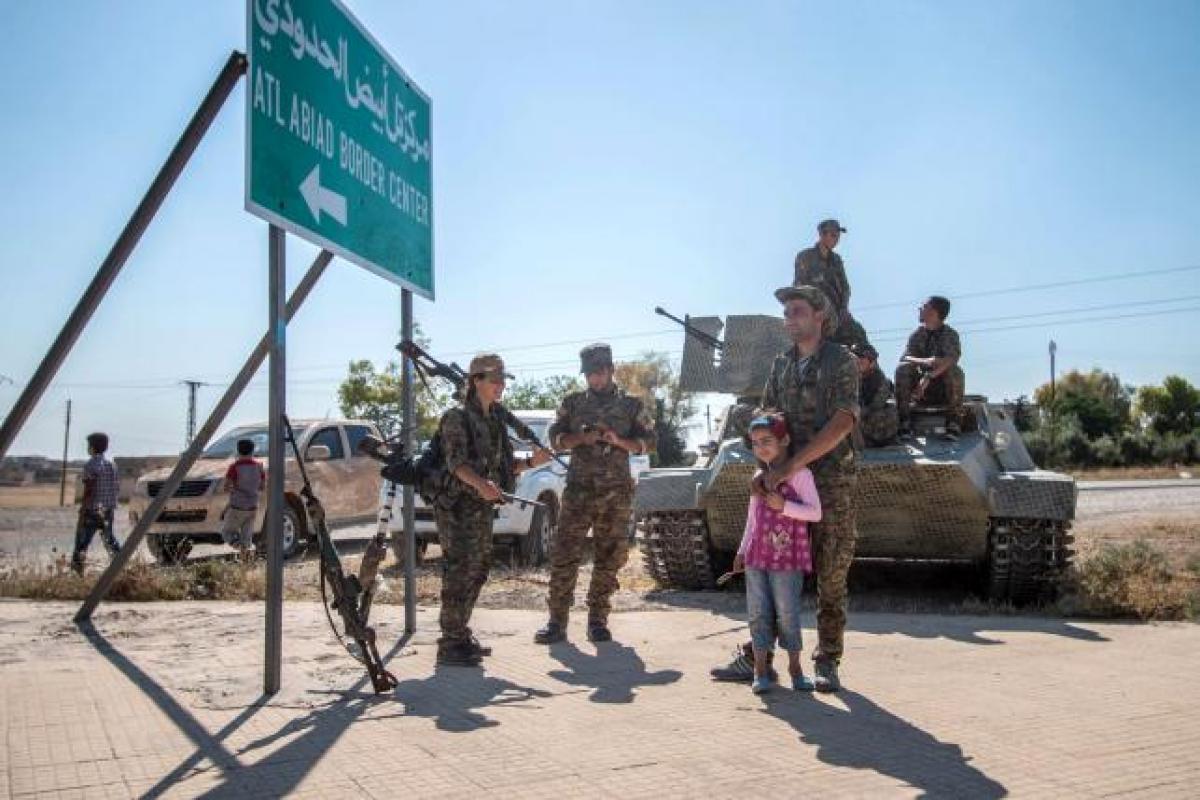Live
- Doubts crop up over recent fire in steel plant
- Average grievance redressal time reduced to 13 days
- Cong leader dares Kishan Reddy to bathe in and drink Musi water
- Bonanza for Warangal as govt rains funds ahead of CM’s visit
- No confidence in Biren Singh govt, NPP supremo says after a day after withdrawing support
- Women of steel: Promoting environment conservation, come what may
- APSSDC signs tripartite MoU to upgrade skills of AP youth
- ‘AAP govt settling Rohingyas in Delhi, giving voter cards’
- Students advised to pursue excellence through learning
- Cold wave hits AP, Telangana: temperatures plunge to single digits
Just In

x
Highlights
Kurdish-led forces said on Monday that they had captured a military base from Islamic State in Syria\'s Raqqa province, advancing deeper into territory held by the group and showing new momentum after they seized a border crossing from the jihadists last week.
Kurdish-led forces said on Monday that they had captured a military base from Islamic State in Syria's Raqqa province, advancing deeper into territory held by the group and showing new momentum after they seized a border crossing from the jihadists last week.

The Kurds, aided by U.S.-led air strikes and smaller Syrian rebel groups, pushed on Monday to within 7 km (4 miles) of Ain Issa, a town 50 km (30 miles) north of Islamic State's de facto capital Raqqa city, said Redur Xelil, a spokesman for the Kurdish forces.
"They have been defeated," YPG spokesman Redur Xelil told Reuters.
Islamic State had held the military base, Liwa 93, southwest of Ain Issa, since capturing it from the Syrian military last year.
"This means that the Islamic State keeps collapsing inside its own stronghold," said Rami Abdulrahman, head of the Syrian Observatory for Human Rights, which monitors the conflict.
The rapid advance into Raqqa province has defied expectations of a protracted battle between the Kurdish YPG group and Islamic State fighters, who waged a four-month battle for the border town of Kobani, where the Kurds finally defeated the jihadists in January.
Raqqa is the main seat of power in Syria for Islamic State, the group also known as ISIS or ISIL, which has proclaimed a caliphate to rule over all Muslims from territory it controls in Syria and Iraq.
The United States has been leading an air campaign against the group in both countries since last year. The Kurds have been the most important partner so far for the U.S.-led campaign in Syria, where Washington has far fewer allies on the ground than in Iraq.
The Kurdish front in northern Syria has been one of the few sources of good news for the global campaign against Islamic State since the jihadists made major advances last month in western Iraq and central Syria.
A spokesman for the Pentagon said last week that Islamic State forces had appeared to "crack" at the Turkish border town of Tel Abyad, which fell to the YPG in less than two days, cutting Islamic State's supply route from Turkey.
Thousands of people had fled from Ain Issa towards Raqqa city in the last two days, the Syrian Observatory for Human Rights said.
Some refugees from the Tel Abyad area had accused the YPG of driving Arabs and Turkmen from territory seized from Islamic State. More than 23,000 people had fled northern Syria into Turkey.
With the fighting having moved on and a border crossing reopening, some of the refugees were returning to Tel Abyad on Monday. Hundreds of Syrians, mostly women and children carrying bags of belongings, returned across the border from the Turkish town of Akcakale.
Kurdish officials denied forcing people out and said that such accusations were being made to stir up ethnic strife. The Observatory has said there has been no evidence of systematic abuses by the YPG, though there have been individual cases.
The Kurdish advance is alarming the Turkish government, which is worried the growing Kurdish sway in northern Syria could inflame ethnic unrest among its own Kurdish population.
Ankara has conveyed to Washington its concerns about signs of "a kind of ethnic cleansing" in areas captured by Kurds near Tel Abyad.
The Syrian Kurds have said they do not want their own state, but see their example of regional autonomy as a model for how to settle the war in Syria and elsewhere in the region. Their cousins in Iraq also have self-rule in an autonomous region.
The Kurdish administration's growing strength has led to friction with the Damascus government, which has tended to avoid direct conflict with the Kurds during the four-year war while maintaining a foothold in areas where the Kurds hold sway.
Tensions have flared in Qamishli, a northeastern city split between Kurdish and government forces. Kurdish forces seized several positions from government control there last week following clashes that Kurdish officials said the Syrian government had instigated to stir Arab-Kurdish conflict.
Syrian government officials did not comment specifically on the Qamishli events but have said they suspect some Kurds of harbouring separatist aims.
"In general, (the Kurds) and us are friends, but there is no state of permanent harmony," a Syrian government official said by telephone on condition of anonymity.

Next Story
More Stories
ADVERTISEMENT
© 2024 Hyderabad Media House Limited/The Hans India. All rights reserved. Powered by hocalwire.com







